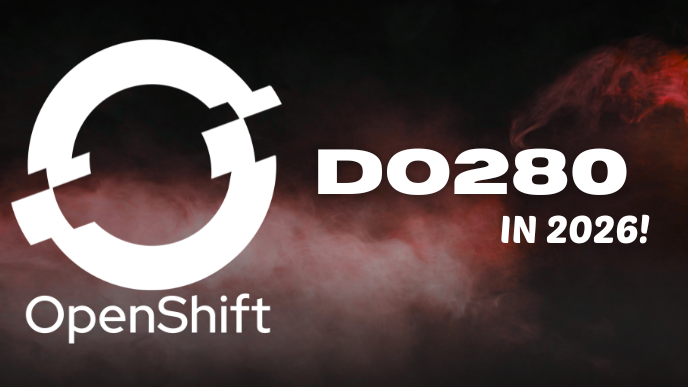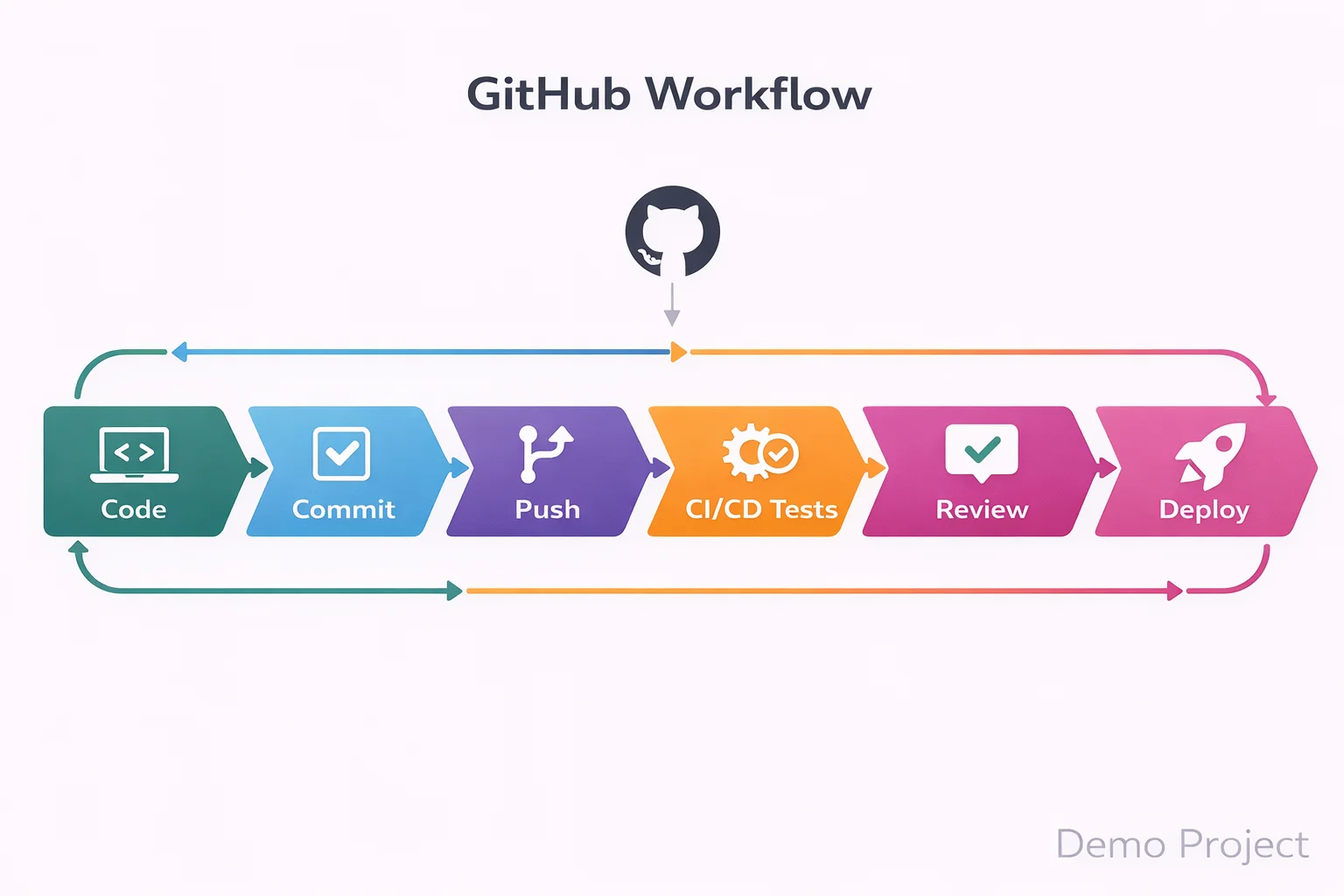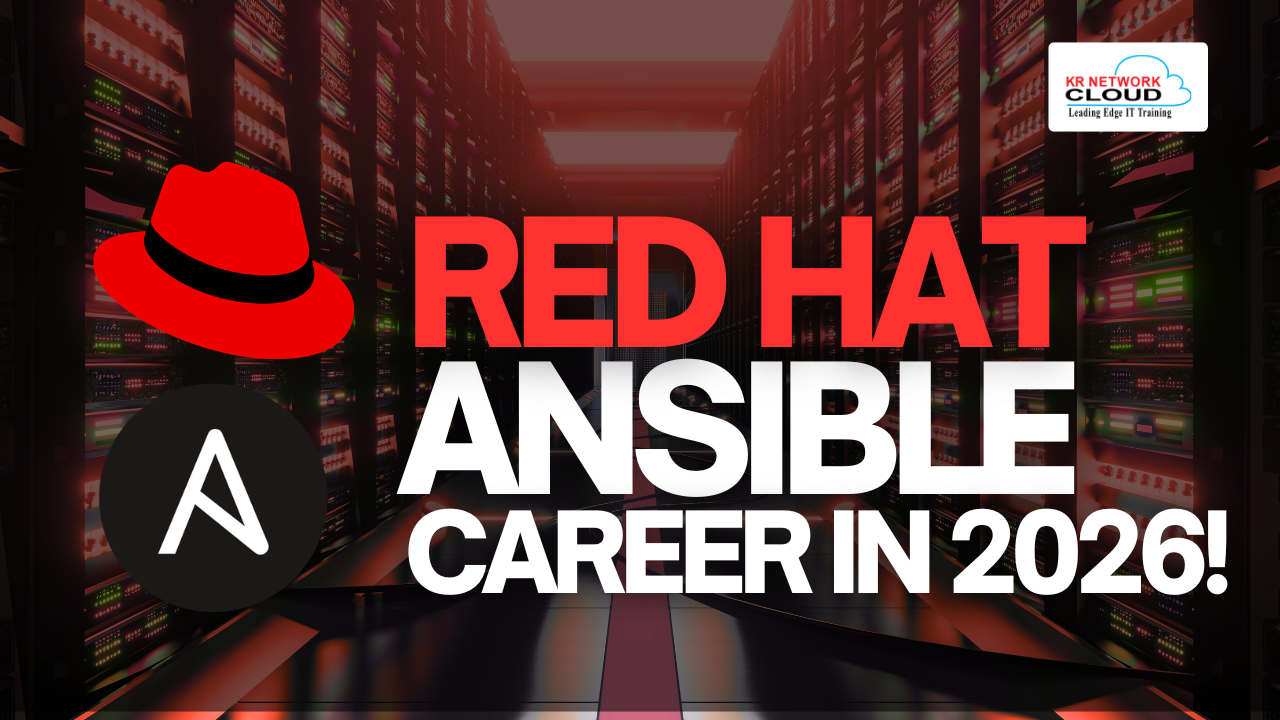Red Hat Certified Engineer (RHCE): Next Step After Completing RHCSA

- KR NETWORK CLOUD
- March 27, 2025
Red Hat Certified Enginner (RHCE): Your Next Step After Completing RHCSA
Congratulations! You’ve just completed your Red Hat Certified System Administrator (RHCSA) certification or gained solid Linux skills. You’re now comfortable with managing Linux systems, handling basic configurations, and troubleshooting issues. But what’s next? If you’re wondering how to level up your career and stand out in the IT world, the answer lies in pursuing the Red Hat Certified Engineer (RHCE) certification with a focus on Ansible. This powerful combination builds on your RHCSA foundation and opens doors to advanced automation and system management opportunities.
In this article, we’ll explore why RHCE and Ansible are the perfect next steps for you, how they enhance your skills, and what you can expect as a student transitioning from RHCSA. We’ll keep it simple, so even if you’re new to the idea, you’ll see the value clearly. Let’s dive in!
Let’s clarify the terms RHCE and Ansible—they’re related but not the same. As a student who’s completed RHCSA, understanding these terms will help you see how they fit into your learning journey. I’ll break it down simply, explain what they mean, how they differ, and who offers them.

What is RHCE?
RHCE stands for Red Hat Certified Engineer. It’s an advanced certification that builds on your RHCSA (Red Hat Certified System Administrator) skills. While RHCSA focuses on foundational Linux administration—like managing files, users, and basic services—RHCE takes you deeper into system administration and automation. It’s designed to prove you can handle complex tasks in enterprise environments, such as configuring advanced networking, securing systems, and automating processes.
- Who Offers It? RHCE is offered by Red Hat, a leading open-source software company known for its Red Hat Enterprise Linux (RHEL) operating system. Red Hat certifications are globally recognized and respected in the IT industry.
- What Does It Mean? Earning RHCE means you’re a skilled Linux engineer capable of managing and automating Red Hat systems at a professional level. It’s a step up from being an administrator to becoming an engineer who designs and optimizes systems.
What is Ansible?
Ansible is an open-source automation tool used to simplify IT tasks like configuration management, application deployment, and system updates. Unlike RHCE, Ansible isn’t a certification—it’s a technology you use. With Ansible, you write “playbooks” (simple scripts) to tell systems what to do, and it executes those instructions across one or many machines. It’s agentless, meaning it doesn’t require special software on the systems it manages, and it uses SSH, which you’re already familiar with from RHCSA.
- Who Offers It? Ansible was created by Michael DeHaan in 2012 and is now maintained by Red Hat, which acquired it in 2015. It’s free to use as open-source software, though Red Hat offers a commercial version called Ansible Automation Platform with extra features and support.
- What Does It Mean? Knowing Ansible means you can automate repetitive tasks, making you faster and more efficient. It’s a skill that’s highly valued in IT because it saves time and reduces errors.
Are RHCE and Ansible the Same?
No, they’re not the same, but they’re closely connected:
- RHCE is a certification: It’s a credential you earn by passing an exam and proving your expertise in Red Hat technologies, including Ansible.
- Ansible is a Tool: It’s software you use to automate tasks. It’s one of the key skills tested in the RHCE exam.
In the current RHCE certification (based on RHEL 8 and 9 as of March 26, 2025), Ansible is a core component. The exam (EX294) focuses on using Ansible to automate system administration tasks on Red Hat Enterprise Linux. So, while RHCE covers broader engineering skills—like managing services and security—Ansible is the automation engine that ties it all together.
How Do They Work Together?
Think of RHCE as the destination and Ansible as one of the vehicles to get there. Your RHCSA gave you the basics of Linux. RHCE builds on that by teaching you advanced administration and how to use Ansible to automate it. For example:
- Without Ansible, you might manually configure a web server on 10 machines—repetitive and slow.
- With Ansible (as part of RHCE), you write one playbook, run it, and all 10 machines are configured perfectly in minutes.
Red Hat chose Ansible for RHCE because it’s powerful, widely adopted, and integrates seamlessly with RHEL. It’s not just about Red Hat, though—Ansible works with other Linux distributions, Windows, and cloud platforms, making it a versatile skill.
Who Offers Them in Practice?
- Red Hat Offers RHCE: You can take RHCE training and exams through Red Hat’s official programs or authorized partners. The certification is Red Hat’s way of validating your skills.
- Red Hat Maintains Ansible: While Ansible is open-source and free for anyone to use, Red Hat drives its development and integrates it into their ecosystem. You don’t “get certified” in Ansible alone—it’s a skill you learn, often through RHCE or other training.
Why This Matters for You
As an RHCSA holder, RHCE is your logical next certification, and Ansible is a critical skill within it. Together, they elevate you from a hands-on admin to an automation-savvy engineer. Red Hat provides the structure (RHCE) and the tool (Ansible), making it a perfect combo to boost your career.
In short:
- RHCE = Certification from Red Hat, proving your engineering chops.
- Ansible = Automation tool from Red Hat, enabling you to work smarter.
They’re distinct but complementary—RHCE teaches you the “what” and “why,” while Ansible gives you the “how” for automation. Ready to master both? Your RHCSA is the foundation; RHCE and Ansible are the rocket fuel!
Why RHCE and Ansible Matter
The RHCSA gave you the essentials: command-line mastery, user management, file permissions, and basic networking. It’s like learning to drive a car manually. Now, RHCE with Ansible is like upgrading to a self-driving car—you’re still in control, but you’ve got tools to make everything faster, smarter, and more efficient.
Ansible, an open-source automation tool, is a key part of the RHCE curriculum. It lets you automate repetitive tasks—like configuring servers, installing software, or managing updates—across multiple systems at once. Instead of logging into each machine and typing commands, you write simple instructions (called playbooks) that Ansible executes for you. This saves time, reduces errors, and makes you a wizard at managing complex IT environments.
In today’s job market, companies love professionals who can automate processes. By adding RHCE and Ansible to your RHCSA skills, you’re not just a system admin anymore—you’re a problem-solver who can handle large-scale systems with ease. Plus, automation skills are a ticket to roles in DevOps, cloud computing, and beyond.
How Ansible Builds on Your RHCSA Knowledge
You already know how to manage a Linux system manually. With RHCSA, you’ve mastered commands like yum, systemctl, and chmod. Ansible takes that knowledge and supercharges it. Here’s how it connects to what you’ve learned:
- Automation Made Simple: Ansible uses a language called YAML, which is easy to read and write. You don’t need to be a programmer to get started. For example, instead of manually installing a web server on 10 machines, you write one playbook, run it, and Ansible does the work across all systems instantly.
- Scalability: RHCSA taught you to manage one system at a time. Ansible lets you manage hundreds or even thousands of systems simultaneously. This is a game-changer for real-world IT jobs where efficiency is everything.
- Consistency: Ever mistype a command and spend hours fixing it? Ansible ensures every task is executed the same way every time, reducing human error and saving you stress.
- Integration: Ansible works seamlessly with Red Hat technologies (and beyond), tying directly into what you’ve already learned in RHCSA. It’s like adding a turbo boost to your existing toolkit.
Think of Ansible as your personal assistant. You tell it what to do, and it handles the repetitive stuff while you focus on bigger challenges—like designing systems or solving complex problems.
What You’ll Learn in RHCE with Ansible
The RHCE certification builds on RHCSA by diving deeper into system administration and introducing automation. It’s hands-on and practical, preparing you for real-world challenges. Here’s what you’ll gain:
- Advanced System Management: You’ll learn to configure complex services like web servers (Apache), databases (MariaDB), and firewalls—skills that go beyond RHCSA basics and make you a versatile admin.
- Ansible Basics: You’ll start with writing playbooks to automate tasks like software installation, user management, and system updates. It’s straightforward once you get the hang of it.
- Real-World Scenarios: RHCE focuses on practical labs. You’ll simulate managing enterprise-level systems, a skill employers value highly in candidates.
- Efficiency Boost: By the end, you’ll know how to automate entire workflows, making you faster and more productive than ever before.
For example, imagine you’re tasked with setting up 50 servers with specific software and security settings. Without Ansible, that’s hours (or days) of manual work. With Ansible, you write a playbook once, run it, and you’re done in minutes. That’s the kind of power you’ll unlock with RHCE.
Why This Is the Right Move for You
As a recent RHCSA graduate, you’re at a crossroads. You could stick with basic admin tasks, but the IT world is moving fast toward automation. Learning Ansible through RHCE keeps you ahead of the curve and sets you up for long-term success. Here’s why it’s a smart choice:
- Career Growth: RHCE is a respected certification that proves you’re ready for senior-level roles like systems engineer, automation specialist, or DevOps professional.
- Higher Pay: Certified professionals with automation skills often earn more than those without. Ansible expertise is in high demand, especially in enterprise environments.
- Future-Proofing: Automation is everywhere—cloud computing, DevOps, IT operations. Ansible prepares you for all of it, ensuring your skills stay relevant.
- Confidence Boost: Mastering Ansible gives you the confidence to tackle big projects and impress employers with your efficiency.
Plus, Ansible is fun! It feels like magic when you see tasks you used to do manually happen with a single command. It’s a rewarding step up from RHCSA.
How to Get Started with Ansible?
Ready to take the plunge? You don’t need to feel overwhelmed—here’s a simple roadmap to guide you:
- Review RHCSA Skills: Make sure you’re confident with Linux basics like file systems, permissions, and services. Ansible builds on these, so a strong foundation is key.
- Learn Ansible Basics: Start with free online tutorials (Red Hat’s website or YouTube) or Ansible’s official docs. Try writing a simple playbook to install a package—it’s easier than you think!
- Enroll in RHCE Training: Look for KR Network Cloud’s courses (online) that cover the Ansible Technology Training as well as the RHCE Exam objectives. Red Hat offers official training, but there are affordable alternatives, too.
- Practice, Practice, Practice: Set up a home lab with virtual machines (use tools like VirtualBox, VMware WorkStation or Red Hat’s free trials) and experiment with Ansible playbooks. Break things and fix them—that’s how you learn!
- Take the Exam: The RHCE exam is hands-on. You’ll solve real-world problems using Ansible and Red Hat tools, proving you’ve got what it takes.
Tips for Success
- Start Small: Begin with basic Ansible tasks (like creating users) before moving to complex playbooks.
- Join a Community: Forums like Reddit’s r/ansible or Red Hat’s community pages are great for advice and support.
- Stay Curious: Experiment with Ansible beyond the RHCE scope—try automating personal projects to build your skills.
Final Thoughts on your RHCE Learning path
Your RHCSA certification is a huge achievement, but it’s just the beginning. By stepping up to RHCE and mastering Ansible, you’re not only enhancing your Linux skills—you’re transforming into an automation expert ready to tackle modern IT challenges. It’s an exciting, practical, and rewarding journey that will make you indispensable to employers.
To get a kick start in your Ansible Learning Journey, check out the free demo sessions of Ansible Training. Click here to watch
The IT world is waiting for skilled professionals like you. So, what are you waiting for? Dive into Ansible, aim for RHCE, and watch your career soar. You’ve got this!
1. What is the difference between RHCSA and RHCE?
- RHCSA focuses on foundational Linux administration skills, like managing users, files, and basic services on Red Hat Enterprise Linux (RHEL). RHCE builds on this by teaching advanced system management and automation, particularly with Ansible. While RHCSA makes you a capable admin, RHCE prepares you for engineering roles with skills in networking, security, and large-scale automation.
2. Is RHCE worth it after RHCSA?
- Yes, RHCE is a smart investment if you want to advance your career. It’s globally recognized, boosts your earning potential (certified pros often earn 10-20% more), and equips you with automation skills in demand for DevOps, cloud, and enterprise IT roles. It’s the natural next step to stand out beyond basic admin tasks.
3. Do I need to know Ansible before starting RHCE?
- No prior Ansible knowledge is required, but familiarity with Linux basics from RHCSA is essential. The RHCE curriculum (EX294) teaches Ansible from the ground up, focusing on its use in RHEL automation. You’ll learn to write playbooks and automate tasks as part of the training, so you can start with zero Ansible experience.
4. How hard is the RHCE exam compared to RHCSA?
- RHCE is more challenging because it’s hands-on and tests advanced skills, like configuring complex services and automating them with Ansible across multiple systems. RHCSA is about mastering one system; RHCE expects you to manage many efficiently. With practice (especially in a lab), it’s very achievable after RHCSA.
5. How long does it take to prepare for RHCE after RHCSA?
- It depends on your pace and experience. For RHCSA holders with solid Linux skills, 2-4 months of part-time study (10-15 hours/week) is typical. This includes learning Ansible, practicing playbooks, and tackling RHCE lab scenarios. Official Red Hat training can shorten this to 1-2 months with focused effort.
6. What jobs can I get with RHCE and Ansible skills?
- RHCE with Ansible opens doors to roles like Systems Engineer, Automation Engineer, DevOps Engineer, Linux Administrator, and Cloud Administrator. Companies using RHEL, cloud platforms, or automation tools (e.g., AWS, Red Hat, IBM) highly value these skills. Average salaries often start at $80,000-$100,000+, depending on location and experience.
7. Can I learn Ansible without pursuing RHCE?
- Absolutely! Ansible is open-source and free to learn via tutorials, YouTube, or its official docs. However, RHCE bundles Ansible with Red Hat-specific skills and a respected certification, giving you a structured path and a credential employers trust. It’s a faster way to master both.
8. What version of RHEL is the RHCE exam based on in 2025?
- As of March 26, 2025, the RHCE exam (EX294) is based on Red Hat Enterprise Linux 8 and 9. It focuses on Ansible automation within these versions, so practice with RHEL 8 or 9 in your lab to align with the current objectives.
9. How much does RHCE certification cost?
- The RHCE exam (EX294) costs around 20,000 INR (Excluding GST), depending on your region. Training courses (optional) range from 7,000 to 10,000 through Red Hat or KR Network cloud Red Hat Training & Certification Authorized Partners, though self-study with free resources and a home lab can cut costs significantly. Check Red Hat’s website for exact pricing in your area.
10. What are some beginner Ansible tasks to practice after RHCSA?
- Start simple: write a playbook to install a package (e.g., Apache), create users across multiple systems, or manage file permissions. Then, try automating a service restart or deploying a basic web server. Use free tools like VirtualBox or RHEL’s developer subscription to set up a practice lab.
Check out other related blogs also Why Your DevOps Career is Stalled and How Certifications Can Fix It?, Red Hat Certified Engineer Exam Details,







